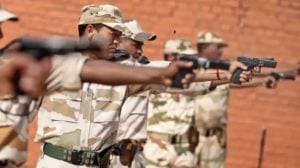US interrogation laws get murkier
At the urging of the White House, US congressional leaders last month scrapped a legislative measure that would have imposed new restriction...

At the urging of the White House, US congressional leaders last month scrapped a legislative measure that would have imposed new restrictions on the use of extreme interrogation measures by US intelligence officers, congressional officials say.
The defeat of the proposal affects one of the most shadowy arenas of the war on terrorism, involving the CIA8217;s secret detention and interrogation of top terror leaders like Khalid Sheik Mohammed, the mastermind of the September 2001 attacks, and about three dozen other senior members of al-Qaida and its offshoots.
The Senate had approved the new restrictions, by a 96-2 vote, as part of the intelligence reform legislation. The restrictions would have explicitly extended to intelligence officers a prohibition against the use of torture or inhumane treatment, and it would have required the CIA as well as the Pentagon to report to Congress about the methods it was using.
But in intense, closed-door negotiations, according to congressional officials, four senior lawmakers from the House and Senate deleted the restrictions from the final bill, after the White House expressed opposition to the measure.
In a letter to members of Congress, sent in October and made available by the White House on Wednesday, Condoleezza Rice, the national security adviser, expressed opposition to the measure on grounds that it 8216;8216;provides legal protections to foreign prisoners to which they are not now entitled under applicable law and policy.8217;8217;
Earlier, in objecting to a similar measure included in a Senate version of the defense authorization bill, the US Defense Department had sent a letter to Congress saying that the department 8216;8216;strongly urges the Senate against passing new legislation concerning detention and interrogation in the war on terrorism.8217;8217;
The Senate restrictions had not been contained in House versions of the defense or intelligence bills
In interviews on Wednesday, Sen. Susan Collins of Maine, a Republican negotiator, and Rep. Jane Harman of California, a Democratic negotiator, both said the lawmakers had ultimately decided that the question of whether to extend the restrictions to intelligence officers was too complex to be included in the legislation.
Some Democratic congressional officials said they believed the Bush administration was trying to maintain some legal latitude for the CIA to use interrogation practices more extreme than those permitted by the military.
8216;Graner defied orders8217;
FORT HOOD: THE defence witnesses presented on Wednesday during Charles A. Graner8217;s court said the soldier didn8217;t follow orders, was warned by superiors about his behaviour and repeatedly beat an Iraqi prisoner while serving as a guard at Abu Ghraib prison. On the fourth day of proceedings, Graner8217;s defence continued to argue that the abuse was encouraged by officials above Graner. The argument was supported by some witnesses, but disputed by others. 8212;NYT
- 01
- 02
- 03
- 04
- 05































